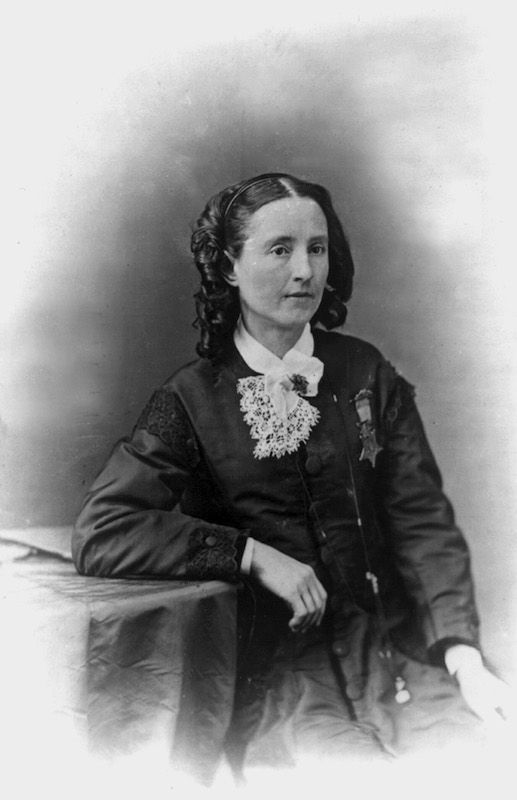
This piece is part of an ongoing series on the unsung women of history. Read more here.
Now that front-line combat in the U.S. military is open to women warriors, women can also win military distinctions like the Medal of Honor. But they’ll be following in the footsteps of a woman who did so over 150 years ago—Mary Edwards Walker, whose military career was as controversial as it was accomplished.
Walker was never interested in a conventional life. As early as her in the mid-19th-century childhood, she hated the restrictive clothing and equally prohibitive gender roles expected of girls. Luckily, her parents were “freethinkers”—radical abolitionists who supported gender equality and dress reform. Provided an education that far surpassed that given most of her female peers, Walker decided to become a doctor. At the time, her aspiration was almost unheard of. Though America already had its first woman doctor, most medical schools (and colleges) barred women.
She found a home at Syracuse Medical College, where she earned her medical degree in 1855. She became the second woman in the country to become a medical doctor and started private practice with her new husband, Albert Miller. She reportedly wore pants to their wedding, refused to vow to obey him and did not take his name, but the marriage was not happy and Walker fought for a divorce for a decade before it was granted.
When the Civil War broke out in 1860, she immediately applied to work with the Union Army as a surgeon. But despite having fewer than 100 licensed surgeons at the beginning of the war, the Army refused to hire her. She volunteered as a nurse instead, though she was barred from battlefield service. After years of nursing, she was finally given an appointment as a contract surgeon for the 52nd Ohio Infantry Regiment in 1863—a move that was regarded as “a medical monstrosity” by colleagues who objected to practicing medicine next to a woman.
Walker knew she was meant for the battlefield, and her service there did not disappoint. She took to her work clothed as a man and unafraid to cross enemy lines (a willingness that resulted in claims by Confederates who saw her that she was working as a spy, not just a doctor, for the Union). Confederate soldiers became familiar with the sight of this unconventional woman, whom one described as “a thing that nothing but the debased and depraved Yankee nation could produce…She was not good looking, and of course had tongue enough for a regiment of men.” Union soldiers didn’t like her much, either—her philosophy that amputations should be avoided whenever possible was incompatible with prevailing Army practices, and multiple colleagues requested that she be removed from her post.
Eventually, they got their wish—but not because she was kicked out of the Army. Rather, Walker was captured by Confederate troops and imprisoned at Castle Thunder, a Richmond prison known for its brutality. Richmond papers reported the new prisoner’s arrival, describing her odd dress and her defiant words. “We must not omit to add that she is ugly and skinny,” wrote one reporter, “and apparently above thirty years of age.”
Walker spent her time in prison writing furious letters to whomever would listen. The maltreatment and starvation she encountered at Castle Thunder would haunt her for the rest of her life, but when she was released via prisoner exchange months later, she went back to petitioning the Army to make her a commissioned medical officer. Those petitions were denied, but in 1865 her service was recognized by President Johnson, who made her the first female Medal of Honor recipient.
Not everyone was happy about Walker winning the nation’s highest military honor. In 1917, Walker’s name was stricken from the Medal of Honor roll along with approximately 910 other recipients (among them Buffalo Bill) who were technically civilians during the Civil War.
Walker refused to send her medal back and wore it daily for the rest of her life, reportedly telling the government that “you will receive it over my dead body.” Unfortunately, Walker was dead by the time her medal was reinstated in 1977—but her legacy lives on, as she remains the only female recipient of the honor.
More Must-Reads From TIME
- The 100 Most Influential People of 2024
- Coco Gauff Is Playing for Herself Now
- Scenes From Pro-Palestinian Encampments Across U.S. Universities
- 6 Compliments That Land Every Time
- If You're Dating Right Now , You're Brave: Column
- The AI That Could Heal a Divided Internet
- Fallout Is a Brilliant Model for the Future of Video Game Adaptations
- Want Weekly Recs on What to Watch, Read, and More? Sign Up for Worth Your Time
Contact us at letters@time.com